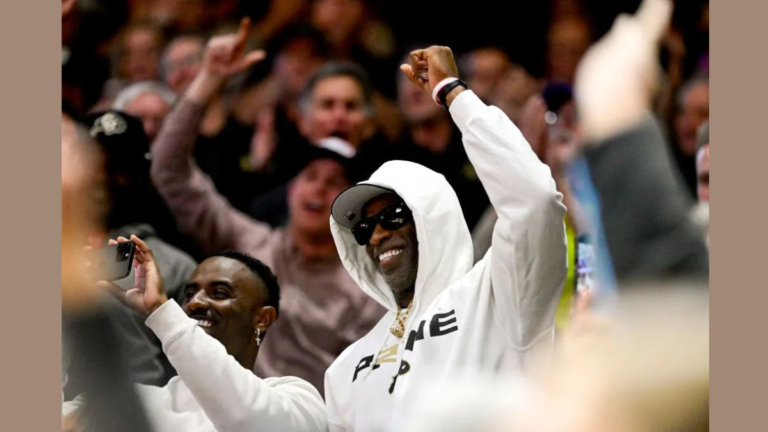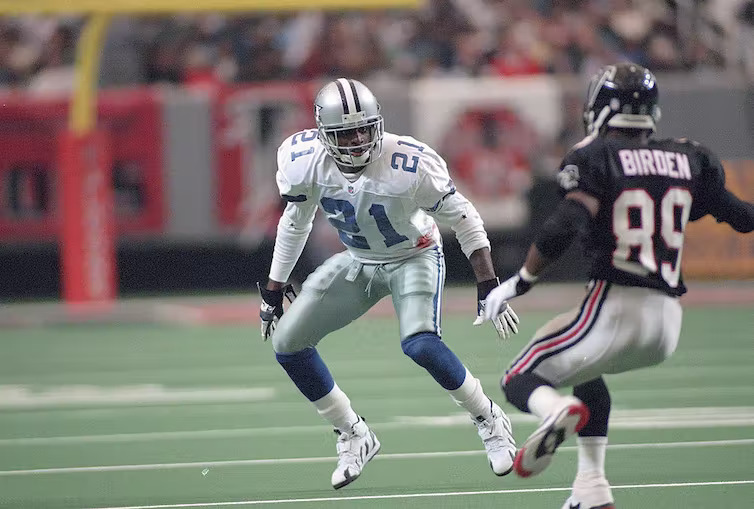
His appeal transcended ethnicity, gender, and wealth, placing him in the company of Michael Jordan, Serena Williams, and LeBron James.
By Jabari M. Evans, Assistant Professor, University of South Carolina
Most college football coaches would applaud the change from a mid-major league to a Power Five conference. Deion Sanders disagrees. Many devoted fans and supporters, especially those from the Black community, responded with dismay and disbelief when the Pro Football Hall of Famer announced he would be leaving Jackson State University, where he has coached the football team since 2020, to become head coach at the University of Colorado Boulder.
Jackson State is one of 107 HBCUs, or historically Black colleges and institutions. Some HBCU graduates and fans saw Sanders as betraying the cause of revitalizing HBCU athletics and returning them to the days when Jerry Rice, Walter Payton, and Steve McNair attended HBCUs as a stepping stone to professional success. On social media and in prominent media sources, debates about whether he was a “sellout,” a “traitor,” or a “hypocrite” erupted.
As a Black culture scholar, I was struck by how this Sanders tale was linked to a notion I write about called clout-chasing. It is the process of using cultural capital on social media to gain media exposure, comments, fans, and recognition. Young people pursuing jobs as content producers are frequently referred to as influence chasers.
Institutions, on the other hand, can pursue influence. And I witnessed Jackson State do exactly that when it recruited Deion Sanders.
Black Education Matters
After the rise of the Black Lives Matter movement, the spread of national anthem demonstrations, and the murders of George Floyd and Breonna Taylor over the last decade, historically black colleges and universities (HBCUs) have received increased attention and investment as sites for the revitalization and progress of the Black community.
In 2019, black millionaire Robert Smith pledged to pay off the student loan debts of Morehouse College’s complete graduating cohort. The Department of Education will give more than $500 million in funding to HBCUs in the summer of 2021. Finally, President Joe Biden’s American Rescue Plan and other forms of pandemic relief have given nearly $3.7 billion in relief money to historically black colleges and universities.
HBCU sports programs have also gotten more attention. Though historically black colleges and universities (HBCUs) have always been overshadowed by institutions in Power Five conferences such as the Big Ten and SEC, HBCU athletics have begun to receive more national media attention. Top prospects have begun to make formal trips to HBCUs as they decide which school to attend.
After star basketball recruit Makur Maker turned down offers from the University of Kentucky and UCLA to attend Howard University in the summer of 2020, The New York Times declared that a trend of top Black athletes attending HBCUs was beginning.
A long-lasting celebrity
I grew up watching Deion Sanders play competitive sports and baseball, as did many others. I looked up to him. He donned gold chains, danced his way to the end zone, dressed up in costly outfits, and, most importantly, he was a star who completely accepted Black popular culture. He was also one of the first sportsmen to recognize his identity off the field. His allure transcended ethnicity, gender, and wealth, placing him in a rarefied group that includes Michael Jordan, Serena Williams and LeBron James.

Sanders’ fame shone brightly even after his playing career finished in 2005. He had his own reality program that was created by Oprah, worked as a regular analyst on the NFL Network, and performed as a pitchman for businesses such as Nike, Under Armour, American Airlines, and Aflac.
Deion Sanders has also effortlessly adapted to the social media age, frequently posting videos to his 3 million Instagram fans. Simply stated, he is still one of the world’s most renowned individuals. Sanders, like his younger peers with massive online followings – digital natives like Odell Beckham Jr. and LaMelo Ball – holds enormous digital influence.
Coach Prime has joined the HBCU ranks
I wasn’t shocked when Sanders made a fast impression in Jackson.
Jackson State rapidly gained national notice as an HBCU juggernaut, thanks to the skills of his son, quarterback Shedeur Sanders, and former top high school prospect Travis Hunter.
After a COVID-shortened 2020 season, Sanders, fondly known as Coach Prime by his players, guided the school to two straight spots in the Celebration Bowl, an annual game in which the winners of the two major HBCU leagues square off. While raising the reputation of Jackson State, Sanders also positioned himself as what scholars like Brandon J. Manning refer to as a “race man,” or a devoted member of the Black race who devotes their life to directly adding to the betterment of Black people.
Under the guise of protecting HBCU sports’ heritage, Sanders stated that he would be better positioned than anyone to do so. He advocated that black student-athletes should attend Jackson State because their affiliation with him would provide them with not only influence, but also the kind of attention and support that they could expect from a Power Five school. However, keeping Sanders at Jackson State if he regularly triumphed was always going to be difficult.
Many people thought Sanders would ultimately want to compete with top-tier programs such as the University of Alabama and the University of Georgia. In reality, during an appearance on CBS’s 60 Minutes in October 2022, Sanders discussed publicly considering offers from larger universities.
Despite these facts, many Black people hoped Sanders would be in it for the long run. They are now concerned that the momentum Sanders provided to HBCU sports may come to a stop.
God alters his opinion
But, unlike some famous Black cultural critics who have slammed Sanders’ choice, I do not believe he is a sellout. When Jackson State engaged Deion, it was presumably looking for some influence of its own. Sanders was a teacher with no expertise beyond high school at the time. He did, however, have a lot of practice acting – and winning – under the highest lights. Jackson State likely realized that taking a chance on an unproven famous coach would be worthwhile: it would garner notice and, with it, money.
On the other hand, I think Sanders realized he could increase his coaching influence at Jackson State by appealing to what scholar Saida Grundy refers to as the Black decorum politics and Christian ideals of HBCU schools. This was evident when he stated that God instructed him to “level the playing field” for those who attend Black institutions. It was always a symbiotic relationship: Sanders used his clout to expand the school that embraced him, but he was also trying to draw the interest of a larger program.
In terms of raising the profile of HBCU sports, I think Sanders did more benefit than damage. Furthermore, no single individual could ever elevate HBCUs to the status of Power Five schools.
Sanders is part of a larger collection of former professional athletes and trainers who are now in charge of HBCU teams. Former NFL head coach Hue Jackson is now the head coach of Grambling State University’s football program; NFL Pro Bowler Eddie George is now the head coach of Tennessee State University’s women’s basketball team; and Olympic gold winner Cynthia Cooper-Dyke is the head coach of Texas Southern University’s women’s basketball team.
If Sanders was a sellout, it was only in one sense: during his time, Jackson State football events regularly sold out, breaking attendance marks for the school.
Jabari M. Evans, University of South Carolina Assistant Professor of Race and Media
The Conversation has reposted this article under a Creative Commons license. Please read the full story.